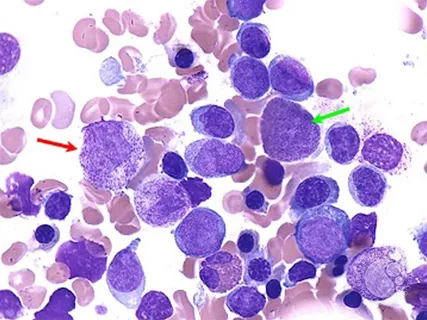A new study conducted by researchers from the Department of Energy’s Pacific Northwest National Laboratory (PNNL) and Oregon Health & Science University (OHSU) aims to improve the outlook for patients with acute myeloid leukemia (AML) by understanding and combatting drug resistance. Despite the availability of nearly a dozen targeted drugs for AML treatment, the mortality rate remains high, with three out of four patients dying within five years. Some patients succumb to the disease within just a month or two, despite receiving multiple drug treatments.
The study, published in Cell Reports Medicine, explores the field of proteogenomics to gain insights into the development of drug resistance in AML patients and identify strategies to slow or prevent this process. Proteogenomics focuses on the study of proteins, the body’s molecular workhorses that play crucial roles in various cellular processes.
For nearly a decade, the research teams from PNNL and OHSU have collaborated to deepen our understanding of the molecular mechanisms underlying cancer and other diseases. While genetic mutations can lead to disease development, it is the complex network of proteins and their interactions that ultimately influence a person’s health.
In this study, the researchers focused on thousands of proteins that may contribute to AML. They conducted an extensive analysis of protein activity in 210 AML patients by measuring levels of nearly half a million protein components from over 9,000 proteins in blood samples. This data was combined with existing information about the disease, including genetic mutations, molecular signaling pathways, the effects of 46 drugs on AML patients, and the disease progression in these individuals.
By integrating protein and gene measurements, the researchers were able to identify patterns of drug response in hundreds of patients, providing a level of detail not previously achieved in similar studies. The team employed artificial intelligence and used various machine learning algorithms to analyze and make sense of the vast amount of data.
Sara Gosline, a data scientist and computational biologist at PNNL, led the research team. She highlighted the significance of this study, stating, “We were able to look at patterns of drug responses in hundreds of people by including protein and gene measurements together, and this gave us a level of detail that hasn’t been possible in prior studies.” Gosline emphasized the potential of leveraging knowledge about protein signaling and machine learning models to improve patient outcomes in the future.
The findings of this study provide valuable insights into the mechanisms of drug resistance in AML and lay the foundation for developing innovative strategies to combat this aggressive blood disease. The integration of proteogenomics and artificial intelligence opens up new possibilities for personalized medicine and targeted treatments. By understanding the intricate interplay between proteins and genes, researchers can uncover novel therapeutic interventions to improve the survival rates and quality of life for AML patients.
*Note:
1. Source: Coherent Market Insights, Public sources, Desk research
2. We have leveraged AI tools to mine information and compile it

